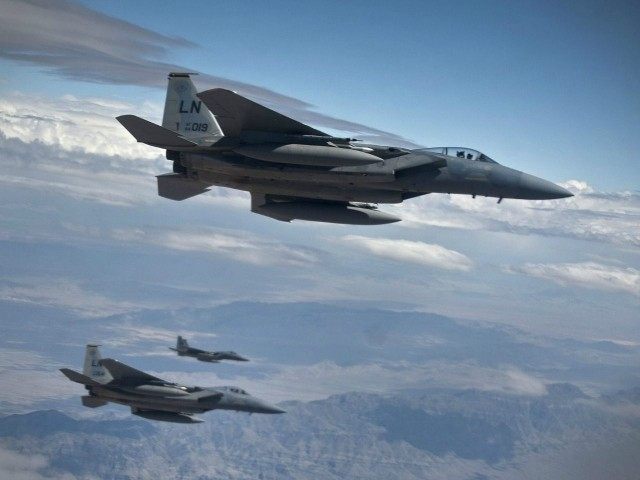On Wednesday, Secretary of Defense James Mattis signed a deal to sell $12 billion worth of American F-15 fighter jets to Qatar, which is currently undergoing a severe diplomatic breach with other Arab nations and has been called into account for its support of terrorism by President Donald Trump.
The Associated Press notes that Mattis formerly commanded the U.S. Central Command, which has its forward operating base in Qatar. Mattis has been one of the most sympathetic senior Trump administration officials toward Qatar, saying on Monday that Emir Tamim Bin Hamad al-Thani “inherited a difficult, very tough situation, and he’s trying to turn the society in the right direction.”
However, Mattis quickly qualified that assessment by saying, “we all agree that funding of any kind of terrorist group is inimical to all of our interest.”
On Tuesday, Mattis told a Senate Armed Services Committee hearing that Russia might have triggered or exacerbated the Qatar crisis to “break any kind of multilateral alliance” enjoyed by the United States. The Qataris have blamed the rift with Saudi Arabia, Egypt, the United Arab Emirates, and other nations on a false account of inflammatory statements by the emir posted to Qatar’s news website by hackers.
The Qataris hailed the deal as a signal of American support for the embattled emirate, despite Trump’s criticism. “This is of course proof that U.S. institutions are with us, but we have never doubted that. Our militaries are like brothers. America’s support for Qatar is deep-rooted and not easily influenced by political changes,” a Qatari official told Reuters.
“Qatar and the United States have solidified their military cooperation by having fought together side by side for many years now in an effort to eradicate terrorism and promote a future of dignity and prosperity,” said Defense Minister Khalid bin Mohammed al-Attiyah.
Whether or not they are like “brothers,” the American and Qatari militaries are certainly like roommates. About 10,000 American troops are stationed at the al-Udeid airbase near Doha, which has played a key role in campaigns in Afghanistan, Iraq, and Syria.
The deal has roots stretching back into the Obama administration, which approved Boeing’s application for a deal nearly twice as large. Reuters quotes a European diplomat who curbed some of Qatar’s enthusiasm by pointing out the timing of the long-developing deal was coincidental, and there is no firm connection between arms deals and foreign policy. From this perspective, the best news Qatar could take from the fighter jet sale is that the Trump administration was not displeased enough to scuttle it.
The Qataris also took great encouragement from a port call at Doha by two American warships and even published media reports that the American vessels would engage in a “joint exercise” with the Qatari Navy, but U.S. Navy sources insisted it was a routine visit and no such exercises were planned.
On Tuesday, the United Arab Emirates ambassador to the United States said the Trump administration could apply even more pressure against Qatar and went so far as suggesting the U.S. remove its troops from the al-Udeid base.
“If I want to be honest, I think the reason action hasn’t been taken against Qatar is because of the air base. The air base is a very nice insurance policy against any additional pressure,” said Ambassador Yousef al-Otaiba.
“Maybe someone in Congress should have a hearing and just say, you know, ‘Should we consider moving it?’ And maybe not moving the entire base. Maybe just distribute to various countries so you don’t have all your eggs in one basket,” he advised.
Otaiba went on to dance a little diplomatic jig around that explosive suggestion by stressing that UAE government is not formally advising the U.S. to relocate from Qatar but said the Emirates would be “willing to have that conversation,” should the Trump administration feel so inclined.

COMMENTS
Please let us know if you're having issues with commenting.